
BBC Science Focus
GOING DEEP
An advanced new research station is being developed to explore the potential for a human settlement under the ocean
4 min |
March 2025

BBC Science Focus
Fast radio bursts: Are these mysterious signals from deep space getting even stranger?
New discoveries are shaking up what little we thought we knew about fast radio bursts
5 min |
March 2025
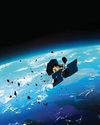
BBC Science Focus
ARE SATELLITES BURNING UP IN THE ATMOSPHERE BAD FOR THE ENVIRONMENT?
About 13,000 satellites currently orbit Earth, roughly 10,000 of which are operational. But that number is set to skyrocket, with a staggering 50,000 new satellites on track to join them by 2030.
2 min |
March 2025

BBC Science Focus
WHY DO I FIND IT SO DIFFICULT TO SWITCH BETWEEN TASKS?
First, the good news is you’re not alone – most people are terrible at task switching. Secondly (and in even more good news), psychologists have been studying it for decades to figure out why.
1 min |
March 2025
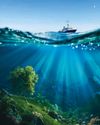
BBC Science Focus
ECHOES OF ATLANTIS
OVER HALF A MILLION PEOPLE MAY HAVE LIVED IN THE LOST LANDSCAPES NORTH OF AUSTRALIA... BEFORE THEY WERE CONSUMED BY THE OCEAN
9 min |
March 2025

BBC Science Focus
Earth's inner core may be changing its spin and its shape
Changes to seismic waves travelling through the planet could reveal unusual activity in Earth's core
3 min |
March 2025

BBC Science Focus
A glimpse into the future of space born surveillance
New mapping by ESA satellites could track everything from natural disasters to illegal activity
1 min |
March 2025

BBC Science Focus
Energy companies shift blame to consumers
Study finds top polluters weave 'eco-hero' narratives
3 min |
March 2025

BBC Science Focus
A helping hand
INTERNATIONAL SPACE STATION
1 min |
March 2025
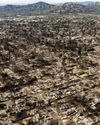
BBC Science Focus
The aftermath
ALTADENA, CALIFORNIA
1 min |
March 2025

BBC Science Focus
We can learn valuable lessons from the ‘polar bear capital of the world'
As the climate crisis pushes humans and animals closer together, it's crucial that we coexist with kindness
3 min |
March 2025

BBC Science Focus
The map that may lead to a new obesity treatment
A better understanding of the pathways in the human hypothalamus has huge possibilities for medicine
3 min |
March 2025
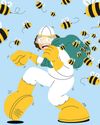
BBC Science Focus
WHAT'S THE CRAZIEST THING EVER STOLEN?
Most robberies involve the sort of goods you would typically expect - jewellery, electronics, or just plain old cash.
2 min |
March 2025

BBC Science Focus
THE ASIAN PALM CIVET
The world might have paid little attention to the Asian palm civet, were it not for the Dutch settlers who planted coffee trees on the islands of Java, Sumatra and Sulawesi, some 300 years ago.
2 min |
March 2025

BBC Science Focus
HOPE PREVAILS
Optimism trumps mindfulness when things get tough, says the science
3 min |
March 2025

BBC Science Focus
'Brain rot': is TikTok causing brain abnormalities?
A new study seems to prove what we've all suspected: bingeing on short-form videos is bad for our brains. But not all experts are convinced...
5 min |
March 2025

BBC Science Focus
BEHIND DEATH'S DOOR
They leave their bodies, witness a bright light and return forever changed. But do survivors of near-death experiences truly glimpse the great beyond? New research into the brain's final moments could decode these visions at life's edge
9 min |
March 2025

BBC Science Focus
GET HEART SMART
NEW STUDIES HAVE SHOWN THAT SEVERAL SMALL LIFESTYLE CHANGES CAN DRASTICALLY IMPROVE YOUR HEART HEALTH
10 min |
March 2025

The Week Junior Science+Nature UK
Wildlife watch
As spring begins, Jenny Ackland shows you how to experience nature waking up.
2 min |
March 2025

The Week Junior Science+Nature UK
WEIRD SCIENCE
A round-up of the strangest science stories from around the world.
1 min |
March 2025

The Week Junior Science+Nature UK
M.G. Leonard
Meet the bug-crazy children's author whose love of nature began with reading.
3 min |
March 2025

The Week Junior Science+Nature UK
BOUNCING BACK
Claire Karwowski tells the terrific, turnaround tales of the endangered creatures that are making a comeback from the very brink of extinction.
6 min |
March 2025

The Week Junior Science+Nature UK
Building blocks of life discovered in asteroid
Dust from a distant space rock could hold the secret to life on Earth.
2 min |
March 2025

The Week Junior Science+Nature UK
THE WORLD'S WEIRDEST MUSEUMS
Jenny Ackland takes a whirlwind tour of some of the oddest exhibitions on the planet.
5 min |
March 2025

The Week Junior Science+Nature UK
A pie for Pi Day
Celebrate this mathematical holiday with a deep-fill dessert.
1 min |
March 2025

The Week Junior Science+Nature UK
Could we use volcanoes to make electricity?
Find out if people could tap into Earth's fiery depths to generate energy.
2 min |
March 2025

The Week Junior Science+Nature UK
HEADSCRATCHERS
Seeking answers to your science questions? Ask our resident expert, Peter Gallivan
3 min |
March 2025
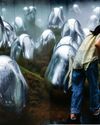
The Week Junior Science+Nature UK
LIVING ORBS
At most exhibitions, you’re told not to touch the artworks.
1 min |
March 2025

The Week Junior Science+Nature UK
People wiggle ears to hear
Can you wiggle your ears? It’s a trick only some people can do, but it turns out that the muscles used to do it also activate when humans are trying to listen to something.
1 min |
March 2025

The Week Junior Science+Nature UK
Skydiving salamanders grip with toes
A new study has found that wandering salamanders pump blood in and out of their toes to help them grip.
1 min |
